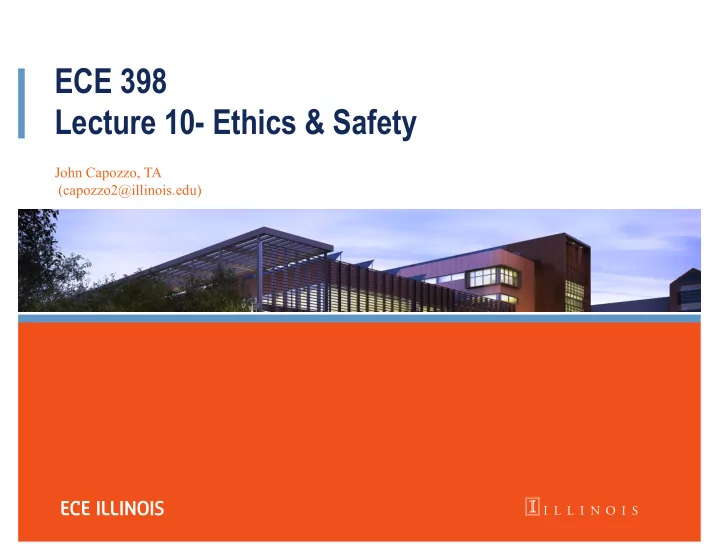

ECE 398 Lecture 10- Ethics & Safety John Capozzo, TA (capozzo2@illinois.edu)
Ethics & Safety § Do you agree with the following: 1. The difference between ethical and unethical is generally clear. 2. Most people can agree on the difference between being ethical and unethical . 3. The definition of ethics is stable and well-defined. 4. A potentially unethical issue or condition is usually clear when it happens. 5. Solving an ethical issue or condition is straightforward once it has been identified. 6. The probability of facing a situation similar to the case studies (Challenger or Bucky Balls) in my own career is low. 7. I know where I stand on ethics.
Misconception # 1: l The difference between ethical and unethical is usually not clear . - Ethics is determined by many things. Major ones being: 1. Risk 2. Perception 3. Added Value 4. Standards – IEEE, ACM, etc. Question: How do you quantify the inputs to these equations?
Misconception # 2: l Many people do not agree on the difference between being ethical and unethical. - Consensus is influenced by many things. Major ones being: 1. Schedule 2. Cost 3. Demand 4. Contracts 5. Perception Question: What is the role of professional organizations in ethical design and engineering?
Misconception # 3: l The definition of ethics is constantly changing and being revised. - The definition of ethics is dependent on many things. Major ones being: 1. Current technical capabilities 2. Previous experience 3. Environment and setting 4. Use case 5. Perception Question: What kind(s) of things convolute the definition?
Misconception # 4: l Solving an ethical issue is almost never straight-forward and almost never without some consequence(s). Typical models of how a “disaster” occurs. Question: What’s a good strategy to prevent a disaster?
Misconception # 5: l Identifying an ethical violation or issue is the easy part. The rest is more challenging. Some important terms: Ombudsman- a resource to anonymously discuss ethical concerns, issues, and violations Whistleblowing- The disclosure by a person, usually an employee in a government agency or private enterprise, to the public or to those in authority, of mismanagement, corruption, illegality, or some other wrongdoing. Legal/Strict Liability- this gets complicated. Question: How would knowing you will not be caught affect your decision-making?
Misconception # 6: l You are guaranteed to face at least one major ethical dilemma in your career. Some things to think about: “I can does not mean I should” “Am I willing to accept the consequences if I make an unethical decision?” “Am I willing to accept the consequences if I make an ETHICAL decision?” “Should my decision making be governed by my morals, the law, or what is ethical? What’s the difference? “How am I expected to act by my boss? By my company? By society? By my parents? Question: Are you familiar with the standards upon which your decision making will be measured and assessed?
Misconception # 6: l You are guaranteed to face at least one major ethical dilemma in your career. Some things to think about: • Morals - an individual’s view of a situation. “personal beliefs and values that inform the many decisions that a person makes from day-to-day” ( Purtillo, 2005 ; Makela, 2009 ). • Laws – a minimum standard of behavior “the rules of conduct set forth by a controlling authority to facilitate harmonious living among groups of people” ( Makela, 2009 ). • Ethics - “involves systematic judgments of value regarding ‘how people - ought to act toward one another’ as members of l a particular societal group” ( Kitchener, 2000; Makela 2009). - Question: “ Should my decision making be governed by my morals, the law, or what is ethical? What’s the difference?”
Misconception # 7: l I know where I stand on ethics. Maybe, but it’s a hard thing to do and it will change. Some major questions to consider: Question: How do I define myself as an engineer? Question: What do I consider ethical and unethical? How does that differ from everyone else's view? Question: What is my brand and my reputation? Question: How will my decisions impact my brand/reputation? Question: What is my personal mission statement?
Designing for Safety and Ethical Design l Your responsibilities: 1. Be familiar with standards and standard ethical practices 2. Highlight areas with your design has potential to violate any of these standards 3. Design these violations out of your design 4. Quantify, define, highlight, and control risk 5. Define EVERYTHING and DOCUMENT all of it
Recommend
More recommend